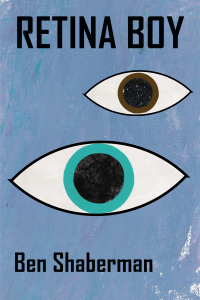Shaberman Combines Love of Science, Writing in Sci-Fi Novel Debut
Ben Shaberman – Senior Director of Scientific Outreach & Community Engagement at Foundation Fighting Blindness – combines his skills in science and storytelling to create Retina Boy, a sci-fi young-adult novel that weaves friendship, love, music, and an alien world of blind inhabitants into a delightful read.
Shaberman tells of the adventures of a Midwestern boy named Doug Anderson, who was born without retinas. Researchers were mystified by the boy from Des Moines, while strangers and friends were mesmerized by his luminescent, aquamarine eyes. A school kid taunts him, calling him Retina Boy, and Doug decides he likes his new nickname; it sounds like a moniker for a superhero, rather than a label given to someone who didn’t quite fit in, Shaberman writes.
 The 59-year-old author and Washington, D.C., resident chose Des Moines as the setting for his novel published last fall because he lived there for a while and was taken by the expanse of the landscape and the endless cornfields.
The 59-year-old author and Washington, D.C., resident chose Des Moines as the setting for his novel published last fall because he lived there for a while and was taken by the expanse of the landscape and the endless cornfields.
“Iowa was very different from the mostly urban places where I’ve lived,” Shaberman said. “I also needed a place to land an alien spacecraft undetected and be relatively near a retinal research center. University of Iowa is about 100 miles from Des Moines.”
Retina Boy grew up to be a carefree teenager, playing lead guitar in an awesome, classic rock cover band. His girlfriend, Marcy, though unable to walk, was the smartest kid in their school. They were a perfect pair – she was his eyes and he was her legs. Never did Retina Boy imagine he was from another planet, and that he and Marcy would be called upon to save the Earth and an alien world of blind inhabitants on the brink of environmental collapse.
Shaberman’s talent as a science writer for the Foundation shines throughout the 202-page book, and we read familiar passages about genetic therapies and rare inherited retinal diseases (IRDs) that he writes about regularly in a column for Sofia Sees Hope’s newsletter, Seeing Hope.
“One of my roles early on at the Foundation was to write about families affected by inherited retinal diseases. While there were always obvious and significant challenges for parents, I was often amazed by how well the kids were doing in their lives,” he said. “Their courage and perseverance always impressed me. That was part of the inspiration.
“But I also wanted to write something fun and adventurous that would appeal to both adults and children of all backgrounds and abilities. And, it was nice for me to take a break from the serious business of reporting on research.”
Among praise for the book from the rare retinal disease community, Sofia Sees Hope Co-Founder and President Laura Manfre, wrote: “A dynamic and fun read from beginning to end that touches on all of the elements of YA fiction today, while also dealing with issues of being different – being rare in one’s world or another world. I thoroughly enjoyed it!”
One of Shaberman’s characters, Dr. Ted Strong, a long-time clinical researcher into rare retinal diseases, had delivered difficult news to hundreds of parents in his 25-year career. But with Doug’s parents, Peter and Peg, he struggles, as Shaberman writes:
“Usually there’s some atrophy or dysplasia of the rods or cones. We often see pigmentary changes,” he said, rubbing his hand through his thinning brown hair. “But with your son, I mean, well, there’s hardly any retina. It’s so thin, a shadow of what it should be. Yet, the rest of his eyes appear to be relatively normal. The way eye development works, this can’t… uh… this shouldn’t happen.”
Dr. Strong tries to reassure the parents, who understand their son is blind but feel scared upon hearing their son’s case is singularly rare.
“I understand your concern, but there’s no easy answer,” the doc says. “Your son might have a very rare genetic defect. It could have been some type of spontaneous mutation during early development, or it could be inherited.”
Reality vs Science Fiction
With Shaberman’s career firmly based in reality, why write sci-fi?
“Early on, I came up with the premise of a planet of blind inhabitants and that made the science-fiction genre inevitable. Science fiction was an entirely new genre for me and quite daunting. Creating an alien world of blind inhabitants was an incredibly difficult process,” he said.
“The story alternates between Earth and Zooba, the planet of the blind. I didn’t intend for the book to be YA and the story has appealed to all ages. But the story’s main characters are kids who become teenagers, so I think the YA label fits.”
Shaberman said he wanted to emphasize music in the novel, which he describes as an adventure of friends, aliens, retinas, and rock & roll.
“The book is filled with references to music, especially classic rock and electronica from the early ’70s and some other popular songs and artists. In essence, the book has a soundtrack. For obvious reasons, I tried to make sound an important element in the story.”
In the writing process, Retina Boy’s girlfriend, Marcy, emerges as a central character.
“In many ways, I became more attached to her than Retina Boy. She is a genius and a force to be reckoned with. Many times, she is running the show.”
Shaberman also said he’s received a wide range of reactions to the book’s ending.
“No spoilers here, but all I can say is it isn’t conventional.”
Readers can view an animated trailer of the book on YouTube.
Dedicated to the ‘rare’ among us
Shaberman dedicated his book to all individuals and families with challenging visual impairments.
“I am especially grateful to those with retinal degenerative diseases, such as retinitis pigmentosa (RP), Leber congenital amaurosis (LCA), Usher syndrome, Stargardt disease, and age-related macular degeneration.
“As a writer for the Foundation Fighting Blindness, I’ve had the privilege of interviewing dozens of people and families impacted by these retinal conditions. While I fully embrace the Foundation’s mission to eradicate all retinal degenerative diseases, Retina Boy is an homage to those who persevere and thrive despite having few treatments or cures for their vision loss. Their courage, resourcefulness, and resilience have been incredibly inspiring for me. They are my heroes.”
“I’ve also had the privilege of reporting on retinal research advancements for emerging therapies to save and restore vision. It has been a fascinating journey.”
Shaberman offers thanks to more than 65 scientific investigators for enlightening him – a nonscientist – about the retina and related research.
His previous books include a work of fiction called Jerry’s Vegan Women and a collection of essays called The Vegan Monologues. His essays, articles and commentaries have appeared in The Washington Post, Chicago Tribune, The Baltimore Sun, Des Moines Register, VegNews magazine, Sky & Telescope magazine, and on National Public Radio.

